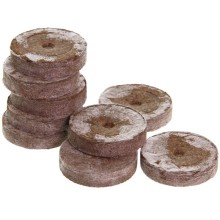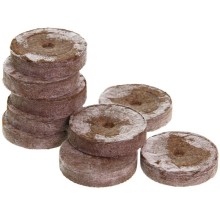- today
- label Plant cultivation
- favorite 5 likes
- remove_red_eye 2067 views
- comment 0 comments

Coconut and peat pellets for plant germination: an excellent choice for your garden.
All gardeners know the importance of proper plant germination. Well-rooted seedlings are the key to healthy growth and abundant harvest. Among various germination methods, coconut and peat pellets are gaining increasing popularity. They are not only effective but also environmentally friendly. In this article, you will learn why using these pellets is beneficial, how they are made, and what sizes they come in.
Coconut and peat pellets are natural substitutes for traditional planting mediums such as garden soil. They are made from dried peat or compressed coconut coir. One of the main advantages of these pellets is their excellent water retention. They absorb moisture well while providing adequate air circulation around the roots. This makes plant germination more controlled and effective.
Coconut and peat pellets for plant germination most commonly come in three popular sizes: 24 mm, 33 mm, and 44 mm. The appropriate size choice depends on the type of seeds or seedlings you want to germinate.
The 24 mm diameter pellets are the smallest and are usually used for germinating smaller seeds or delicate seedlings. Their compact size makes them ideal for small pots or seedling trays. They are easy to handle and provide a good balance between moisture retention and air permeability.
The 33 mm diameter pellets are widely used for germinating larger seeds and seedlings. This is a versatile size that works well in most cases. They provide sufficient space for root growth while maintaining optimal moisture conditions and airflow.
The 44 mm diameter pellets are the largest and are mainly used for germinating larger seeds or seedlings that require more root space. This size is often used for germinating plants from the squash family, beans, or tomatoes. They provide access to a greater amount of nutrients, contributing to strong plant growth.
The choice of the appropriate size of coconut and peat pellets depends on the gardener's preferences and the specific requirements of the plants to be germinated. When purchasing the pellets, it is always worth checking the recommended size provided on the seed or seedling packaging. This ensures optimal germination conditions and the beginning of healthy growth for the plants.
Why should you use coconut and peat pellets for plant germination? First and foremost, they are environmentally safe. Peat and coconut coir are renewable resources derived from natural sources. Their production does not involve the destruction of the environment, as is often the case with soil extraction. Moreover, these pellets are biodegradable, which means that they can be integrated into the soil after use, leaving no harmful traces.
Another advantage of coconut and peat pellets is their convenience. They are lightweight, easy to store, and transport. They can be easily moved from one place to another in the garden or pot. Additionally, these pellets are usually sterile and free from weeds and pests, minimizing the risk of plant infections and diseases.
Proper plant germination is key to success in gardening. Coconut and peat pellets are an excellent choice when it comes to creating a favorable environment for seeds and seedlings. They provide the right moisture levels, air permeability, and protection against diseases. Their natural ingredients positively influence root development and stimulate healthy plant growth.
In conclusion, coconut and peat pellets are an excellent solution for plant germination. Their environmental benefits, user-friendliness, and effectiveness make them increasingly popular among gardeners. If you aim for healthy and robust seedlings, consider using these pellets as a germination medium. Nature and your plants will be grateful for such a decision.





Comments (0)